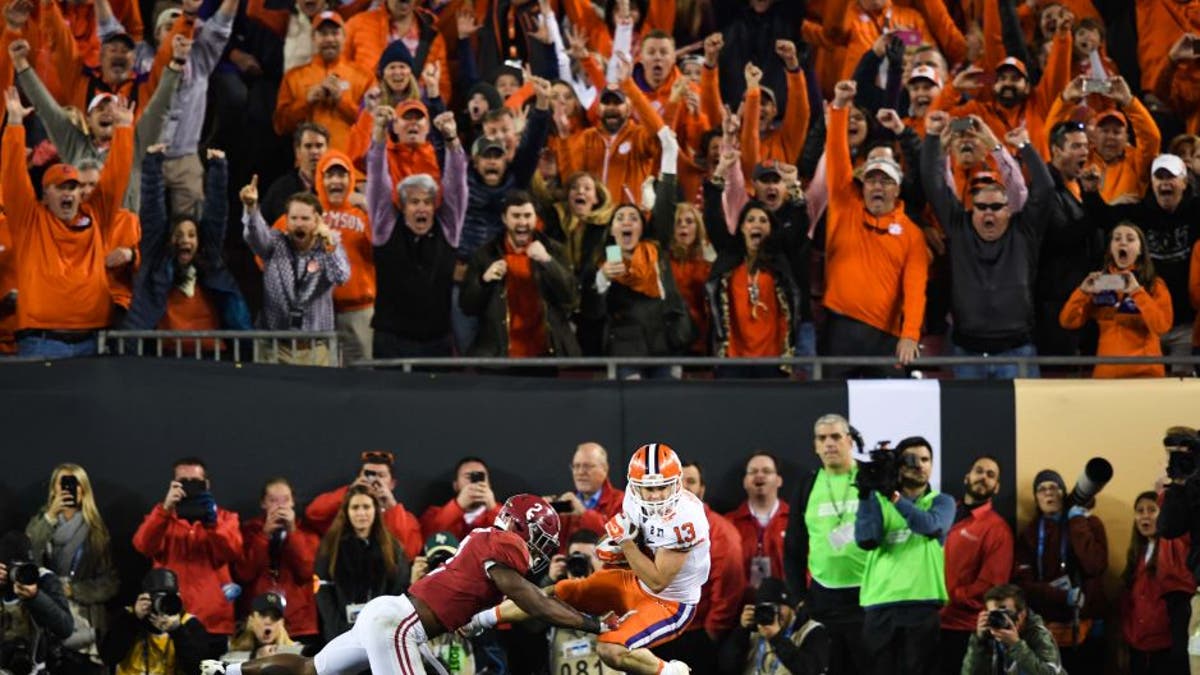
Jan 9, 2017; Tampa, FL, USA; Clemson Tigers wide receiver Hunter Renfrow (13) scores the winning touchdown as Alabama Crimson Tide defensive back Tony Brown (2) defends during the fourth quarter in the 2017 College Football Playoff National Championship Game at Raymond James Stadium. Clemson defeated Alabama 35-31. Mandatory Credit: John David Mercer-USA TODAY Sports
Clemson beat Alabama in the national championship game on Monday night, 35-31, a thrilling end to a very good college football season. The Tigers won the game with a play run with just a few seconds remaining, when quarterback Deshaun Watson rolled to his right and found 5-foot-10 receiver Hunter Renfrow wide open in the corner of the end zone.
He looked almost a little too wide open. And thus began the scrutiny.
Renfrow had found himself in open space because the Tigers had run a pick play, a quick crossing route at the line of scrimmage that saw Clemson receiver Artavis Scott run into Alabama DB Marlon Humphrey. Slot corner Tony Brown was briefly distracted by the pileup, lost sight of his man and then had to recover to Renfrow. It wasn't in time. Clemson won the game.
For fans of Alabama and people eager for something to talk about on sports radio, the play wasn't a good one. It was too shifty. Too much flirting with the line. Pick plays like this need to be "revisited." Even the phrase "pick play" sounds dirty, something to get away with.
Here's the thing: Pick plays are legal. As long as no offensive pass interference occurs, there's nothing wrong with having two receivers run routes that are meant to make things difficult for DBs. It's been happening forever.
I've now watched the play many times, and the thing I'm struck by is this: Clemson did nothing wrong. Scott ran at Humphrey, but Humphrey welcomed the contact, being physical at the line and getting his hands on Scott, who was happy to go down when he did so. Brown didn't react quickly enough.
It was a good play, and one that is legal. If Scott had dove hard at the legs of Humphrey, you'd have a case to make. He didn't. Humphrey grabbed him high, he went down. It was a legal play.
Alabama's Tim Williams talked to FOX Sports' Bruce Feldman after the game, and conceded he didn't think the refs should have flagged it:
Williams said that usually on a pick play, the offensive player isn't supposed to chip somebody. That you're just supposed to pick them and go onto your route. "But that guy literally chopped (Marlon) down, but hey, that's football." But Williams added that he didn't think the refs should've flagged it.
Feldman also notes that Alabama was expecting the play, as injured defensive star Eddie Jackson was on the sideline screaming "WATCH THE PICK! WATCH THE PICK!" before the snap.
It's easy to nitpick and wonder who initiated contact on the final play, but the fact remains that Alabama didn't defend it well. Despite Jackson's screams on the sidelines, Alabama didn't do what it needed to do. Pick plays are hard to defend, but not impossible to defend. You just need to do it right. Alabama didn't do it right.
A pick play decided Super Bowl XLIV, but the Patriots anticipated it and defended it -- Brandon Browner jammed the picking receiver at the line of scrimmage, allowing Malcolm Butler a free line to the ball and a history-changing interception.
Alabama's defense was exhausted after a long game (and season). It had committed pass interference on the previous play, and couldn't execute well enough on the final play. That shouldn't mean pick plays should be banned. It means that Clemson played a great game.
And besides ... Alabama has used plays like this to win big games before.
